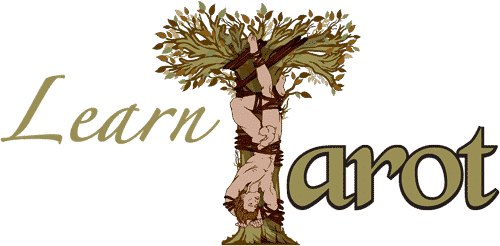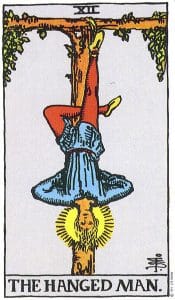

The Fool’s Journey
The Fool sits, cross-legged, under a tree, determined to find his spiritual self. There he stays for many days, as people walk past, and rain, sun, the moon, and the stars pass him by.
Then, without a thought he climbs the tree, and suspends himself upside down. The money in his pockets falls to the ground, and from this perspective, somewhere between the physical world and the spiritual one, he sees money for what it is – just round scraps of metal.
He discovers a connection to the world around him that he hadn’t known before. He feels the oneness of everything.
Knowing that all things shift and change, he understands that he can’t stay in this moment of connectedness forever. Eventually, he’ll have to return to his normal perspective, where things will be different and he’ll have to try to reconcile and live with the enlightenment he has received.
Card meaning
The story of The Hanged man is a true paradox. It teaches that one must be still and go within in order to understand movement and everything without. It represents the power of enlightenment, and how when one receives that power, they feel connected to the bigger world while at the same time understanding how small they are—like understanding what a drop is compared to the ocean. The lesson of The Hanged Man is easy to understand, but hard to apply. Even the symbology of the card itself is a paradox—one of the most simple designs yet a giant lesson.
The Hanged Man reminds us that the most obvious answers are the simplest, but rarely the best. When you release control, things operate as they should. The only way forward is to stop running. Admitting your fears is the only way to gain the power to conquer them.
Telling these lessons to others is easy, but trying to live them yourself is difficult.
Look at the card again: Telling someone to hang from a tree is easy enough, but how many people actually want to go out and do it? The Fool must be uncomfortable in this position, but he is often depicted with a smile and a halo around his head, because in his sacrifice, in his stillness, he has found strength and a comfort beyond physical comfort. The knowledge he has gained is the truest source of comfort.
The Hanged Man will also appear when you must sacrifice one thing to get something else you want of equal value. Choosing between two good things like two good jobs, is something we do all the time as inspired human beings. For example, we may desire solitude and connection, and so we will choose to either spend an evening at home or go out with friends. Neither decision is the wrong one, but each will bring a different sort of inspiration. Rarely do we face indecision when a choice has an uneven amount of risk vs. reward. Often when we are asked to sacrifice something valuable, we are rewarded with something of greater value—and this lesson is the perfect summation for the paradox that is The Hanged Man.


